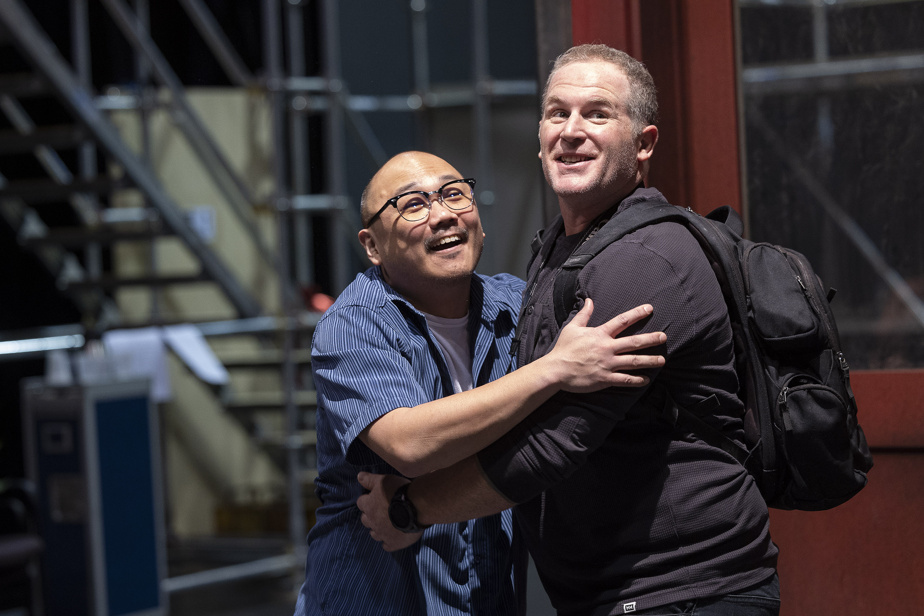Millions of us were shocked by this photo taken in 1989: a man carrying simple plastic bags and facing the tanks alone in Tiananmen Square in Beijing.
This iconic photo, taken on the second day of a massacre perpetrated by the Chinese authorities to put an end to a student and worker demonstration, is at the heart of one of the most intriguing and most anticipated pieces of the winter return to school. Its title: Chimerica.
The play, by Briton Lucy Kirkwood, tells the story of the quest of an American photojournalist named Joe Schofield (played by Alexandre Goyette) to find the very man he had photographed from the window of his hotel room one day of June 1989. Twenty-three years after the events (the action takes place in 2012), no one knows what happened to this anonymous man raised to the rank of hero in the West, but erased from the history books in China.
For the Duceppe company and the director Charles Dauphinais, the presentation of this play was a journey strewn with pitfalls.
“From the start, I knew that I wanted actors who mastered Mandarin to play in the play, because I wanted us to have access to the rhythm, the color and the modesty of this language,” explains Charles Dauphinais. However, it was very difficult to find artists who spoke both French and Mandarin…”
Worse, the subject of the piece put off certain potential audition candidates, who preferred to withdraw from the project for fear of reprisals.
Although Chimerica is based on the real events that took place in Tiananmen Square in 1989, the story told here is fictional. “It’s clearly a Western point of view on what happened,” says Alexandre Goyette. My character is very revealing of the position of North America and the United States, always very focused on themselves. His blindness speaks volumes about the way we behave in the face of certain political or economic events. »
His photojournalist character is obsessed with his desire to find the famous “Tank Man”. He hopes that this stroke of brilliance will allow him to revive his career in freefall.
“Chimerica is the West which vampirizes a historical event, which will appropriate it to deliver its speech, to flaunt its success,” says Charles Dauphinais. It is the metaphor of an America that is losing its vitality through the character of a photographer who wants to thumbs down on what made him successful 20 years ago. »
“With this play, Lucy Kirkwood sheds light on how everyone perceives history. Joe’s character places the emphasis on the individual, whereas it was an entire community that mobilized at Tian’anmen and demanded all kinds of things,” said actress Shiong-En Chan. .
Because beyond the famous photo, what happened at Tian’anmen on June 4 and 5, 1989 shook the lives of thousands of people, she recalls. “There have been several repercussions on a human level. We hear of 10,000 people killed. The figure is questionable, we will never know the exact number, but Lucy Kirkwood goes beyond statistics. The play is about those who remain. »
The play also tells a love story that runs parallel to political history. “The two main characters are lonely men: Joe lost the woman who could have changed his life and his friend Zhang Lin lost the woman who changed his,” explains Shiong-En Chan.
For the actress who studied in Montreal, at the National School, Tian’anmen Square is closely linked to the Chinese people’s thirst for democracy. “That thirst has always been there. Whenever the people had the slightest opportunity, they took it, but they always faced severe repercussions. He was never able to taste this democracy. However, I wonder if the hope of being able to express oneself without censorship still exists today, if this desire is as strong…”
Derek Kwan, who plays the character Zhang Lin, has a different vision when he thinks of Tian’anmen Square, a vision far removed from the protests and repression of 1989. “The first thing that comes to mind when I think of Tian’anmen, the days spent with family flying my kite there. »
Now based in Toronto, the actor did not hesitate to dive into this unprecedented theatrical adventure for him. He also admits that in his eyes, theater always remains a political act. “Speaking out is important. I work a lot for diversity on stage, for inclusion. It is a great privilege to be able to share this project with other Asian actors, in particular. »
Shiong-En Chan sees things differently: “For me, theater is not a political act. Here, I do it more out of a duty of memory, to honor those who lost their lives in this massacre. »
As for Alexandre Goyette, he is happy to be able to experience this moment when Mandarin will be heard loud and clear on the Montreal stages. Of course, there will be surtitles to help the audience understand the few scenes in the Beijing language, but for the actor, there is no doubt: “Even when we don’t understand, the emotion comes through. . It’s fascinating ! This text is a real page-turner! »
